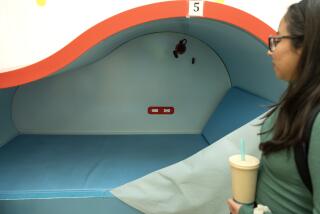Tips to Help College Students Avoid School Daze
When I was preparing to go off to college, my biggest purchasing decision was to pick out the appropriate Smith Corona electric typewriter. As long as I used a black ribbon, I didnât have to worry about any compatibility issues.
Today, students and their parents have a bit more to think about.
Should they get a Macintosh or a Windows PC or rely on a public machine at the campus computer lab? What accessories and peripherals will they need and how will they connect their computer to the Internet or the campus network?
The Mac versus Windows PC question can be a tricky one.
A few years ago, it was common for colleges to express a strong preference, and on many campuses the Mac was king.
Today, the Mac is still popular on college campuses, but it no longer dominates.
Even Brown and Dartmouth, which were once Mac bastions, are starting to see an increasing number of Windows users, according to computer experts I spoke with on both campuses.
Still, some schools or departments within schools have a preference, so itâs a pretty good idea to check with the college before you buy a PC. One place to start is the collegeâs Web site.
UC Berkeley (https://www.berkeley.edu), for example, has a computing link on its front page that leads you to an area with advice for students including the comment that âcomputer ownership is highly recommended (though not yet required).â Students are further advised to âcheck first to see if your department requires Macs or PCs.â
My advice is to get whatever type of computer youâre used to unless the college or department offers you a compelling reason to switch.
*
A word of warning: Find out if youâre getting an official recommendation or just an opinion.
This is especially true in the âMac vs. Windowsâ debate where emotions often run high. Be suspicious if they have nothing but superlatives for one machine and mainly negative comments about the other. If you have any questions about the advice youâre getting, speak with a faculty advisor or an academic counselor.
Hampshire College doesnât care what brand of computer you bring to campus, but, like many institutions, they do recommend minimum system configurations.
Parents might hand down their old car or antique stereo system, but when it comes to PCs and Macs, newer is better. You donât need the fastest machine around, but colleges donât want students to bring old clunkers that canât run the current operating systems and up-to-date software.
*
If you need a new PC be sure to call the campus store and ask for a computer specialist. Many campus stores sell or take orders for computers and the salespeople should have a pretty good idea what others are buying. Many college Web sites have a link to the campus store and some even have prices online.
Campus stores often offer special deals on hardware and software. Discounts on hardware used to be substantial, but margins on computers are now so low that itâs hard for a campus store to discount them much further.
Still, there are some deals. Stanford students, for example, can save the shipping costs on a Dell computer if they order it and pick it up from the campus computer store.
Many schools offer an academic discount on Apple equipment, which can usually save students a couple of hundred dollars on current models. However, you might be able to get a better deal on a soon-to-be discontinued Mac from a store or online dealer. The bookstore page on USCâs Web site (https://uscbksserv.usc.edu) has links to special Apple and Compaq educational Web pages.
Youâve probably heard about the free or very cheap PCs that are now on the market. Most of them require that you sign up for an Internet service as part of the deal.
Circuit City (https://www.circuitcity.com), for example, is offering a stylish EMachines PC for only $399 after rebate. The machine, which looks quite a bit like an Apple iMac, is more compact than most desktop PCs, which could be ideal for a small dorm room. It even comes with an ethernet card, which is a big plus.
But that price is based on a $400 rebate from CompuServe that requires you to sign up for three years worth of service at $21.95 a month, or a total of $790.20.
CompuServe is a good Internet service provider (ISP), but students usually donât need an ISP because most get free Internet access while theyâre at school.
Another question is whether to get a notebook PC or a desktop model. Notebook PCs take up less space in a dorm room and can be carried to classes, libraries and friendsâ rooms and are easy to take home during breaks. But theyâre more expensive than similarly equipped desktop models and more likely to be lost or stolen. If you do get a notebook PC, be extra careful to back up your data, and check to see if the notebook PC is covered by your homeownerâs or renterâs insurance policy.
*
Configuring a computer for use in a dorm room is different from configuring it for use from home or an off-campus apartment.
Many colleges now have ethernet ports in dorm rooms so there is no need for a modem or extra phone line. You will, however, need an ethernet connector, which is built into most Macs and is an option on most Windows PCs. You can add an ethernet connector to a desktop PC for about $30. Ethernet cards for laptop PCs cost a bit more.
Although you might not use it at school, most PCs now come with a built-in modem, which could prove handy if you take the machine home during the summer.
Campuses typically have network printers, so you donât absolutely need your own. However, printer prices have dropped so low that itâs probably worth getting one for convenience. You can buy a Canon BJC-1000 or a Lexmark Z11 color ink jet printer for as little as $49 after rebates.
Be aware that there are usage costs. Printer manufacturers make money on ink cartridges, so it might still be a good idea to use the campus network printer when possible.
Lawrence J. Magid can be reached at [email protected].






